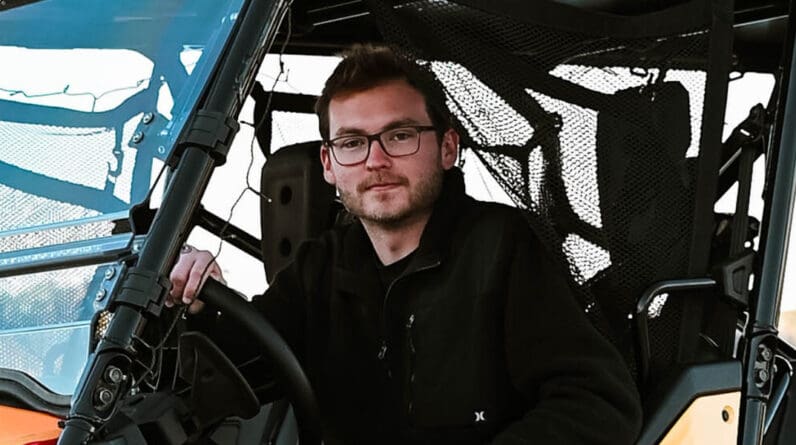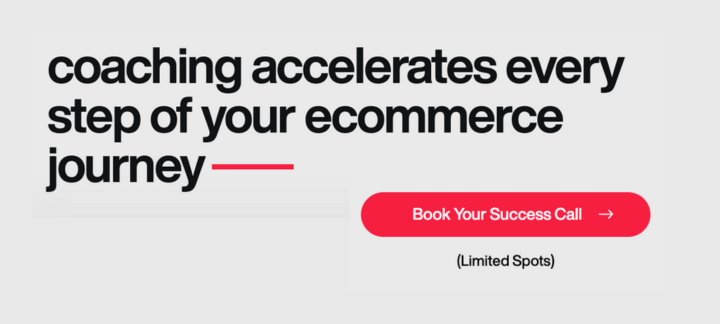
If you’re looking for Sid Mathis, you probably won’t find him behind a desk or in a meeting—not if he doesn’t have to be. More likely, he’s somewhere covered in mud.
Mathis is the founder of Vessel Powersports, a company he started in 2019 that supplies aftermarket parts for all-terrain vehicles (ATVs). He created the company for the same reason many founders launch their startups: Sometimes, when you can’t find what you need, you have to make it yourself.
That’s what happened when Mathis started riding ATVs after a serious cycling accident but couldn’t connect with companies that made the parts he wanted to customize his vehicle.
In the southern United States, all-terrain can mean mud, and a lot of it, especially where Mathis’ company is located in Florida. The state is also home to a large community of people who love riding ATVs, but the vehicles often need to be customized to better handle the waterlogged conditions. The list of what’s needed to ensure that a vehicle can make it through the mud, from wheels to headlights, can be long. And the cost of these aftermarket upgrades adds up quickly.
Prior to launching his company, Mathis was looking to grow his personal social media following and become an influencer in the hopes of garnering sponsorships and parts for his ATVs. He thought it would be an avenue to support his pastime when he wasn’t cleaning house exteriors for work. But when he tried reaching out (again and again), no one responded. Or worse, they’d say no.
It was a turning point.
If no one else was going to support his journey, Mathis decided to make it on his own.
“Once I got shut down and told no, that’s what put the fire under me to get started and take it into my own hands,” he says. And he has.
“Once I got shut down and told no, that’s what put the fire under me to get started and take it into my own hands.”
Now Mathis is the one getting requests for sponsorships. But unlike the companies he reached out to in the past, he’s always ready to connect with people who love ATVs as much as he does.
“I knew that was a hole that I never wanted to fall into,” he says. “So that challenge started with me trying to reach out. Now I make sure every DM, every message, every call, everything is responded to within the same day.”
And he makes sure his passion shines through in his social channels so people want to make that connection.
“The stuff people get to see isn’t really the business side,” Mathis says. “But they get to see the fun.”
Keeping the fun on Vessel Powersports’ social media channel has been key to building brand awareness and community.
But the road to get where Vessel Powersports is now has had its own challenging terrain.
The Many Facets of Social Media
Scrolling through the Vessel Powersports Instagram account, it doesn’t take long before you come across Mathis’ beaming, bespeckled face as he rolls through the dirt on an ATV.
It’s no wonder the account became an instant hit when he started posting videos and pictures of his rides. Within a week, he had a thousand followers.
“I was like, well, maybe I like this better than the hard outside labor,” he says.
From there, he turned all his energy to working on four-wheelers and expanding his following.
“I was doing this every second I could and started realizing social media is everything and content is key.”
“I was doing this every second I could and started realizing social media is everything and content is key.”
Social media became central to building his business because it was the best way to connect with the people interested in his products. They could genuinely see themselves reflected in Mathis’ content. And if they were new to ATVs, it helped them learn.
“They’ve never been in the industry before or [in] the community, and they want all the tips and knowledge they can get,” he says. “So that gives them someone to trust.”
It’s also a great way to get feedback from customers about what they would like to see developed next for their ATVs. Whenever Vessel Powersports makes a post asking people what parts they want to see on the market, it’s a chance to connect directly to the needs of their customer base. They can use that information to figure out what to develop next. Connecting across platforms like Instagram and Snapchat or through text allows them to provide a personal touch and gain valuable insight.
Now, people entering the industry ask Mathis for advice or promotion on his channels. And since he experienced firsthand what it was like when companies don’t pay attention, he’s always willing to share insights from his experience.
“My biggest response has been, ‘Make more content,’” he says.
He’ll often check their pages and find two or three videos posted months ago. He knows it takes a lot more than that to build and maintain a following. He says it’s important to stay consistent and find a few things to post about each day. It doesn’t take long and is more a matter of intentionally making a small window of time during the workday, whether that’s in the morning or evening or on a lunch break.
Not prioritizing content creation is a sure way to lose potential business and relevance in the algorithms. Mathis sees it often with companies he used to follow.
“They don’t post, and I slowly forget about them,” he says. “A week, two weeks, three weeks, and then they’re just gone completely.”
Mentorship Lays the Groundwork for Growth
As a newbie to the business world, Mathis looked for guidance to help scale. He’s learned that not knowing what you don’t know can often be the biggest barrier to taking the next step. Meanwhile, competing information about best practices and endless advice on the internet can be overwhelming and keep a person from making decisions.
“There’s so much out there. If you don’t have the tools or the guidance to get somewhere, you’re doing circles all day, every day,” he says.
Since he was a teenager, he’s always looked for this kind of mentorship from the adults around him. He asked them questions about their work, for advice, and for ways to help him grow in the future.
Foundr’s coaching program gave him that same extra push. It was an investment in cultivating the skills needed to grow his business.
He relates it to personal fitness.
“I want to get a workout, but it’s like, where do I start?” he says. “That’s the same with business. You want to start a business or get to that next level, but you don’t know where to go. … If I ran into a problem that I couldn’t solve or that I couldn’t figure out within a certain time frame, I could jot it down and then touch back with my coach.”
One vital piece of advice Mathis gleaned from his coach is to connect with five new people or companies a day. Not to sell them something but as a friend, expert, or member of the community. Mathis says the impact of practicing this has snowballed over time.
Even though Vessel Powersports has seen rapid growth and Mathis gets to work on what he loves every day, he still thinks there’s more to figure out.
“I’m only three and a half years in, and I don’t think I know much right now. Maybe 1 percent of what I can learn,” he says.
Using a Set-Back to Make a Leap
It was during the coaching program that Vessel Powersports hit the biggest bump in its business journey so far.
The business didn’t start out with its current name. The company initially supplied parts only for Honda ATVs, a favorite brand in the Southeastern U.S., and its former name reflected that. The startup encountered a major hurdle when it received a letter from Honda asking to change its name. This sparked a legal battle that continued for months.
Although it could have been devastating for Mathis and Vessel Powersports, he handled it with the same attitude he used when he couldn’t find anyone to sponsor him.
Rather than thinking of it as an insurmountable problem, he used it as an opportunity to take things into his own hands. In the end, he frames the experience as a net win because it opened up the door to expand their branding, products, and service area.
“I flipped it around [and] picked the positive out of it. But it’s not every time you can do that,” Mathis says. “It worked out in this situation—we came out with Vessel Powersports.”
“It worked out in this situation—we came out with Vessel Powersports.”
During this time, the company grew.
In the middle of the name change and rebranding, they moved from three small offices totaling 800 square feet into a new 10,000-square-foot warehouse. They now have offices, a 1,600-foot-show room for products, and space to expand the available products.
“Honda coming after us and then wanting their damages fee is kind of paying off in the end,” he says. “I see the spike and what we’re doing, and it’s been going uphill since, trying to stay on that trend.”
He sees how starting and growing a business has been personally fulfilling, too.
“If my brain is not turning or if there’s not a challenge in front of me, I just feel stuck,” he says. But he and Vessel Powersports are anywhere but stuck.
From looking for sponsorship to support his passion, Mathis’ vision is now a fully functional business without him actively running it all the time. In the meantime, the challenges and learning are exciting, and of course, he has the excuse to ride his ATV to make more promotional content.
“If you enjoy it, then it’s the best life you can live, I think,” Mathis says. “And that’s where I’m at right now. Because it’s new every day.”
Keep Learning: 9 Common Business Coaching Questions to Ask Before Taking the Leap
Sid Mathis was a student in Foundr’s coaching program. Click here to learn how you can match up with a business coach that will help you achieve your business goals.








